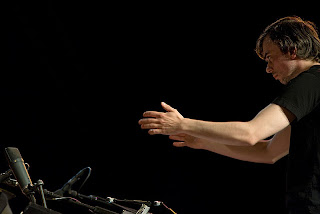Darcy James Argue at New England Conservatory
 |
| Darcy James Argue in 2009, conducting to the void |
The workshop was given in two parts: first, he talked about the impetus for the project and the considerations that played into the composition of this music. He gave three major points:
For musical models, he looked less to film scores and more to ballets. He made a point about how the telling of the Brooklyn Babylon narrative was distinct from film in that it didn't have dialogue or sound effects; instead, he wanted to find models of collaboration between visuals and sound that worked on a more abstract level to convey motion and emotion. In particular, he noted Petrushka ("Because I'm a Stravinsky nut") and Debussy's Jeux as two examples of works that were successful both as a collaborative counterpart and also as standalone stage music.
Long form coherence was also a major consideration, which he addressed conceptually and compositionally when structuring the sequence of pieces for the project. He mentioned that the Prologue that begins the record contained all of the "musical DNA" from which the later transformations and developments would emerge. At one point, we compared a leadsheet for the Main Theme of Brooklyn Babylon to the penultimate piece, "Coney Island," and he identified where he drew from the original theme and what kinds of transformations he applied. Notably, he suggested that certain compositional techniques, such as the different transformations in 12-tone writing, are generally underutilized by jazz musicians, and pointed out that these techniques are really helpful for reinforcing the internal coherence of a long form work.
Lastly, he mentioned his initial concerns about whether the project would work as a standalone record—although I'm sure that many are glad that he decided to record the music and make it available to listeners.
The second part of the workshop was more of a masterclass-style critique of several student compositions. There was plenty of valuable advice—some more conceptual and some more concrete on the level of craft—but a couple points stuck out to me.
At one point, he identified a couple issues with the rendering of dynamics on a score itself, and emphasized how important it is to be meticulous about score notation, saying something along the lines of, "Players should have no excuse to fuck up." He also recommended The Art of Music Copying, by Clinton Roemer ("Everybody should memorize this").
He also addressed how the demands of composition can distort the composer's perception of he piece—that you could spend an entire day writing 10 seconds of music, which is really, really tough, but that this can cause you to lose a sense of proportion with regards to the arc of the overall work. He said something along the lines of, "The ball of momentum should roll all the way down the cliff," referring to sections of a piece that are moving somewhere but still require a bit more work on the part of composer to get the piece to that destination.
Infinite Jest also came up, miraculously, and it came up with regards to the artistic decision to thwart expectations. The point Argue made was that thwarting expectations is all well and good, but it should serve the purpose of forcing the audience to reflect on why their expectation was thwarted in the first place, i.e., why was this expected moment withheld or substituted with something unexpected? The end of Infinite Jest is not the end of the novel proper—it ends at the conclusion of a convalescing character's lengthy revisiting of a memory, and a year before the formal end of the plot action. This formal end is actually the very first chapter, which is set a year ahead of the main action of the novel, which itself is not clear to the reader during the first read through. It's sort of like the ending of Finnegan's Wake, which ends mid-sentence at the same point at which the mid-sentence first words of the novel begins; the justifications for this kind of formal circularity are various, but probably one of the most common reasons given for the IJ form is that it embodies the type of perpetual consumption of entertainment that the eponymously named video recording causes—except that Infinite Jest is the literary, artistic alternative to this mindless, numbing film Infinite Jest. But to get back to Argue's point, thwarting expectations should be done for a specific reason; it's cool to do it, but if asked, you've got to be able to explain why you chose to do it.
If you happen to be around Cambridge or Boston tomorrow, he and the Secret Society will be performing one set (only one!) at the Regatta Bar at 7:30 p.m. in Harvard Square. I highly recommend it, and be sure to check out Brooklyn Babylon, too.

Comments
Post a Comment